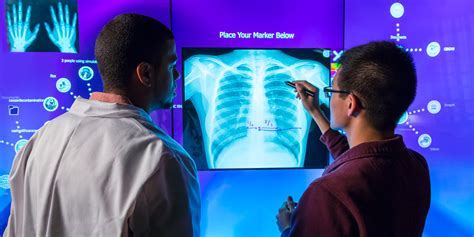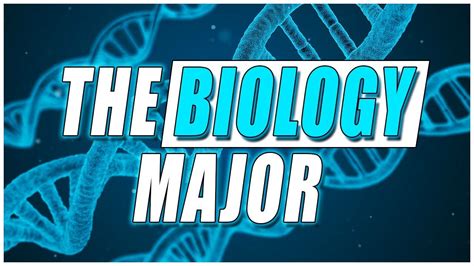Careers For Biology Majors

For those with a passion for life sciences, biology offers a diverse range of career paths that extend beyond the traditional laboratory setting. From researching and developing new medical treatments to studying ecosystems and promoting environmental conservation, biology majors have the opportunity to make a meaningful impact in various industries. In this article, we will explore the wide array of career options available to biology graduates, highlighting the specific skills, knowledge, and real-world applications that make these professions both rewarding and essential.
Research and Development in the Pharmaceutical Industry

One of the most well-known career paths for biology majors is in the pharmaceutical industry. With a strong foundation in biology, individuals can contribute to the research and development of new drugs and treatments. The pharmaceutical sector offers a dynamic environment where biologists can collaborate with chemists, pharmacologists, and medical professionals to address unmet medical needs and improve patient outcomes.
Biological Research Scientist
Biological research scientists play a pivotal role in driving innovation within the pharmaceutical industry. They design and conduct experiments to investigate the biological mechanisms underlying diseases, identify potential drug targets, and develop novel therapeutic strategies. For instance, a research scientist might focus on studying the genetic basis of a particular disorder, aiming to develop targeted therapies that can revolutionize treatment approaches.
The skills required for this career include a deep understanding of molecular biology, genetics, and cell biology, as well as expertise in laboratory techniques such as DNA sequencing, protein analysis, and cell culture. Research scientists often work in multidisciplinary teams, collaborating with experts from diverse fields to translate basic research findings into practical applications.
Drug Development Specialist
Drug development specialists are responsible for the complex process of bringing a new medication from the research stage to market approval. They work closely with research scientists, regulatory affairs specialists, and clinical trial coordinators to ensure the safety and efficacy of potential drug candidates. These professionals must have a comprehensive knowledge of drug discovery and development processes, including preclinical testing, clinical trials, and regulatory requirements.
One notable example of a drug development success story involves the development of a breakthrough treatment for a rare genetic disorder. A team of biologists, chemists, and medical experts collaborated to identify a novel compound that could effectively target the underlying cause of the disease. Through rigorous testing and clinical trials, they were able to demonstrate the safety and efficacy of the treatment, leading to its approval and providing a life-changing option for patients.
Environmental Conservation and Sustainability

Biology majors can also make a significant impact in the field of environmental conservation, working towards the protection and restoration of ecosystems. With a focus on biodiversity, ecology, and environmental science, these professionals contribute to sustainable practices and help mitigate the effects of climate change.
Conservation Biologist
Conservation biologists study and protect endangered species and their habitats. They work closely with wildlife organizations, government agencies, and non-profit groups to develop conservation strategies, monitor populations, and implement measures to ensure the long-term survival of species. For example, a conservation biologist might focus on researching and preserving a critically endangered bird species, studying its habitat requirements and migration patterns to inform conservation efforts.
Skills required for this career include a strong understanding of ecological principles, wildlife biology, and conservation methodologies. Conservation biologists often conduct field research, analyze data, and collaborate with stakeholders to develop and implement conservation plans. They may also engage in public education and outreach to raise awareness about the importance of biodiversity and the need for conservation.
Sustainability Consultant
Sustainability consultants work with businesses, governments, and organizations to integrate environmentally friendly practices and promote sustainable development. They assess the environmental impact of projects, provide recommendations for reducing carbon footprints, and help organizations adopt sustainable strategies. Biology majors with a focus on environmental science and policy can excel in this field, bringing their expertise to guide organizations towards more sustainable practices.
A real-world example of the impact of sustainability consultants involves a large manufacturing company that sought to reduce its environmental impact. By engaging a team of sustainability consultants, the company was able to implement energy-efficient technologies, optimize waste management systems, and adopt eco-friendly packaging materials. These initiatives not only reduced the company's carbon emissions but also enhanced its reputation as a responsible corporate citizen.
Biotechnology and Genetic Engineering
Biology majors with a keen interest in biotechnology and genetic engineering have the opportunity to work at the forefront of scientific innovation. These fields involve the manipulation of biological systems and organisms to develop new technologies, improve crop yields, and enhance medical treatments.
Genetic Engineer
Genetic engineers use advanced techniques such as gene editing and recombinant DNA technology to modify the genetic material of organisms. They work in various sectors, including agriculture, medicine, and industry, to develop genetically modified organisms (GMOs) that possess desirable traits. For instance, genetic engineers might collaborate with agricultural scientists to develop crop varieties that are resistant to pests or have increased nutritional value.
Skills required for this career include a solid understanding of molecular biology, genetics, and bioinformatics, as well as proficiency in laboratory techniques and equipment. Genetic engineers must also stay updated with the latest advancements in their field, as the technology and techniques in this area evolve rapidly.
Biotechnology Researcher
Biotechnology researchers explore the boundaries of scientific knowledge, investigating new applications of biotechnology and genetic engineering. They work in research institutions, universities, and biotechnology companies to develop innovative solutions to real-world problems. These researchers may focus on areas such as biofuels, synthetic biology, or gene therapy, pushing the boundaries of what is possible in the life sciences.
A notable example of biotechnology research involves the development of a gene therapy treatment for a rare genetic disorder. Researchers used advanced genetic engineering techniques to modify a patient's own cells, introducing a functional copy of the defective gene. This groundbreaking therapy offered a potential cure for a condition that had previously been untreatable, showcasing the transformative power of biotechnology.
Public Health and Epidemiology
Biology majors can also contribute to the field of public health, working to prevent and control the spread of diseases and improve population health. Epidemiology, in particular, focuses on the study of patterns, causes, and effects of health and disease conditions in defined populations.
Epidemiologist
Epidemiologists investigate the causes and spread of diseases, aiming to develop strategies for disease prevention and control. They analyze data, conduct research, and collaborate with public health officials and healthcare providers to implement effective interventions. For example, an epidemiologist might study the outbreak of a contagious disease, tracing its origin and identifying factors that contribute to its transmission.
Skills required for this career include strong analytical abilities, statistical knowledge, and expertise in research methodologies. Epidemiologists often work in government agencies, non-profit organizations, and healthcare institutions, contributing to public health policies and programs. They play a crucial role in identifying emerging health threats and developing evidence-based interventions to protect population health.
Public Health Educator
Public health educators focus on promoting healthy behaviors and raising awareness about disease prevention among communities. They develop educational programs, conduct health campaigns, and provide resources to help individuals make informed decisions about their health. Biology majors with a passion for communication and community engagement can excel in this field, translating complex scientific information into accessible and actionable recommendations.
One successful initiative by a public health educator involved a community-based program to reduce the prevalence of obesity among children. By engaging with schools, parents, and community leaders, the educator developed a comprehensive health education curriculum that promoted healthy eating habits and physical activity. The program not only improved the health outcomes of participating children but also fostered a culture of health and wellness within the community.
Frequently Asked Questions

What are the key skills biology majors should develop to succeed in their chosen careers?
+Biology majors should cultivate a strong foundation in scientific principles, research methodologies, and analytical skills. Additionally, effective communication, critical thinking, and problem-solving abilities are essential for success in various biology-related careers. The ability to collaborate and work in multidisciplinary teams is also highly valued.
How can biology majors stay updated with the latest advancements in their field?
+Biology majors can stay informed by regularly reading scientific journals, attending conferences and workshops, and engaging with professional organizations in their field of interest. Online resources, such as scientific databases and research platforms, also provide valuable access to the latest research and advancements.
What are some common challenges faced by biology majors in their careers?
+Biology majors may encounter challenges such as the rapid evolution of scientific knowledge, the need for continuous learning, and the competitive nature of certain fields. Additionally, careers in biology often require strong problem-solving skills and the ability to adapt to changing research priorities and funding opportunities.
How can biology majors make themselves more competitive in the job market?
+Biology majors can enhance their competitiveness by gaining relevant work experience through internships, research projects, or part-time jobs in their field of interest. Developing strong communication and presentation skills, staying up-to-date with industry trends, and building a professional network can also set them apart in the job market.
Are there opportunities for biology majors to work internationally or collaborate across borders?
+Absolutely! Biology majors have the opportunity to work and collaborate internationally, especially in fields such as global health, environmental conservation, and international development. Many organizations and research institutions actively seek diverse perspectives and expertise, creating opportunities for cross-border collaborations and cultural exchange.
The career possibilities for biology majors are diverse and impactful, spanning across industries and disciplines. Whether it’s contributing to medical advancements, conserving the environment, or improving public health, biology graduates have the knowledge and skills to make a lasting difference. By leveraging their expertise and staying adaptable, biology majors can pursue rewarding careers that align with their passions and make a positive impact on the world.



